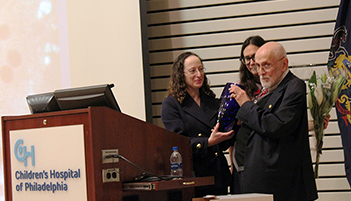HOW CAN WE HELP YOU? Call 1-800-TRY-CHOP
In This Section
Steven D. Douglas, MD, Receives 25th Silver Lecture for Pediatric HIV/AIDS Research
 With an enterprising career spanning 50 years in basic and clinical immunology and more than 500 publications, Steven D. Douglas, MD, had the honor of presenting the 25th Herman and Gertrude Silver Lecture, in which he reviewed major milestones in the field of pediatric HIV/AIDS and shared his optimism that paradigm shifts and new discoveries are ahead.
With an enterprising career spanning 50 years in basic and clinical immunology and more than 500 publications, Steven D. Douglas, MD, had the honor of presenting the 25th Herman and Gertrude Silver Lecture, in which he reviewed major milestones in the field of pediatric HIV/AIDS and shared his optimism that paradigm shifts and new discoveries are ahead.
“We have made great strides over this period of 35 to 40 years,” said Dr. Douglas, chief of the Immunology Section in the Division of Allergy-Immunology at Children’s Hospital of Philadelphia and professor of Pediatrics at the Perelman School of Medicine of the University of Pennsylvania. “We know a great deal about the pathogenesis. We have a strong pharmacopeia of antiviral drugs. We have exciting ideas with new ones emerging. It’s a remarkable story that I’m thrilled to have been a part of in my career and to have watched this evolve.”
Starting in the late 1970s, Dr. Douglas established laboratory methods for investigating two types of immune cells: monocyte-macrophages and lymphocytes. Those cell culture methods have enabled laboratory research throughout the world. Dr. Douglas was among the first scientists to discover that HIV-1 infects macrophages derived from monocytes. He first showed that an important neuropeptide, substance P, exists on these cells, and that it plays a crucial role in neurological manifestations of AIDS. He then identified a pathway shared by substance P and a monocyte-macrophage cell receptor as a potential target for treating HIV infection.
Dr. Douglas’ Silver Lecture titled “HIV/AIDS Virology and Immunology: Toward Durable Success” looked back to the beginning of the HIV/AIDS epidemic in the early 1980s when scientists did not yet understand the role of mother-to-child transmission, and children with untreated HIV infection had extremely high mortality rates of about 25 percent. Today, babies born to women with HIV receive HIV medicines to protect their infants from infection, and fewer than 100 babies with HIV are born each year in the U.S.
While reducing the rate of mother-to-child transmission of HIV is a tremendous success, Dr. Douglas pointed out that many challenges remain. For example, the epidemic is expanding in the adolescent population, and half of young people with HIV are unaware that they are infected. Most new HIV infections among youth occur among gay and bisexual men, with young black/African American and Hispanic/Latino gay and bisexual men especially affected, according to the Centers for Disease Control and Prevention (CDC).
Two of Dr. Douglas’ CHOP colleagues, Elizabeth Lowenthal, MD, MSCE, and Nadia Dowshen, MD, are researching new approaches to educate at-risk young people about HIV prevention and to link them to timely treatment and care. At the end of the Silver Lecture, they presented Dr. Douglas with a special gift: a tall vase achievement award and flowers in recognition of his longstanding commitment to helping children and adolescents living with HIV to thrive.
“The flowers symbolize how your incredible scientific contributions have helped many children and adolescents to bloom and your selfless mentorship of many faculty and trainees who have flourished in their careers,” Dr. Dowshen said.
The Silver Award and Lecture honors individuals who have made significant contributions in the field of pediatric HIV and AIDS. Herman and Gertrude Silver endowed the lecture fund as a lasting memorial to their children, who were treated at Children’s Hospital. Since the first Silver Lecture in 1990, the Fund has recognized physicians and researchers from leading national and international academic institutions, including the National Institutes of Health, the CDC, Oxford University, Rockefeller University, and previous recipients of The Lasker Award and Nobel Prize.